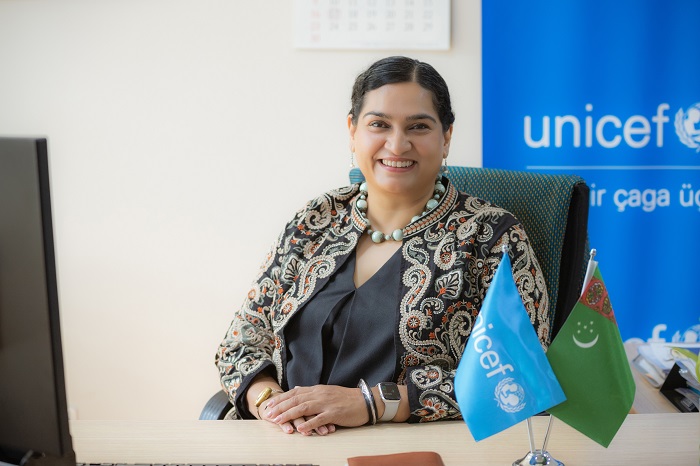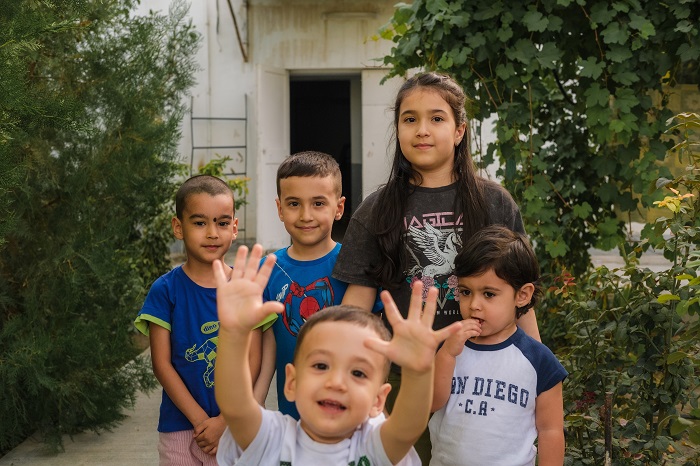Jalpa Ratna, UNICEF Representative in Turkmenistan
Today, as the High-Level Roundtable on Children, Youth, and Climate Action unfolds at COP29 in Baku, we are reminded that the climate crisis is increasingly a child rights crisis. This year, children and young people are again confronting the stark reality that, despite bearing little responsibility for global warming, they face some of its harshest consequences. Today, nearly every child on earth is exposed to at least one climate or environmental hazard. Approximately one billion children live in countries facing extremely high climate risks, and yet global actions remain insufficient to protect them.
UNICEF is actively engaged at COP29 to ensure children’s needs, rights, and perspectives are not overlooked. The challenges the children of the world face are immense: record-breaking heat, floods, droughts, and other extreme weather events are reshaping their health, development, safety, and access to essential services. It is our mission to ensure that children become central to climate policy, action, and investment at all levels.
Catherine Russell, UNICEF’s Executive Director, emphasized the urgency of our collective response: “Children have lived through another year of record-breaking heat, devastating floods, and life-threatening droughts and hurricanes. They are the least responsible for these crises, and yet they bear the greatest burden. Now is the time to act. At COP29, Governments must prioritize children’s rights in the solutions. Global leaders need to make health care, education, water, and sanitation systems – the very lifelines children rely on – resilient to climate impacts.”
This year, COP29 must move beyond dialogue to deliver tangible commitments for children. Nationally Determined Contributions (NDCs) and National Adaptation Plans (NAPs) need to be strengthened to reflect children’s unique vulnerabilities and needs. Today, less than half of NDCs contain any child-specific content, while the impact of climate change on young populations is the disproportionate.
UNICEF’s Call for Action at COP29
At COP29, UNICEF is calling for decisive actions from world leaders to safeguard children’s futures through the following measures:
- Recognize the Impact of Climate Change on Children in COP29 Decisions
We urge that the COP29 Cover Decision formally acknowledges the severe impact of climate change on children and builds on the recommendations from the Expert Dialogue on children and climate change. - Increase Climate Financing for Children
The new financial targets for climate action must be driven by child rights. Current funding is inadequate, and a substantial increase is necessary to meet children’s immediate needs and build resilient, child-focused infrastructures. - Involve Children and Young People in Climate Decision-Making
Children deserve a voice in the decisions that will determine their future. COP29 should set a precedent for empowering children and young people to participate meaningfully in climate policy discussions, ensuring that their unique perspectives are heard and respected. - Ensure polices and plans Reflect Children’s Needs
To secure a livable future, we must prioritize children in climate action. UNICEF urges that all new Nationally Determined Contributions (NDCs) and National Adaptation Plans (NAPs) be child-sensitive, recognizing the severe and unique impact of climate change on children. These policies must include ambitious emissions reduction targets aligned with the 1.5°C goal and prioritize climate-resilient critical social services, including education, health, water and sanitation (WASH), and social protection systems. We call on policymakers to include children—especially those from marginalized communities—in these planning processes, ensuring their voices and needs shape resilient solutions. NDC budgets should explicitly allocate resources to safeguard and strengthen child-centered services. To support this, we emphasize the need for robust data tracking on climate impacts on children to inform responsive and evidence-based policy actions.
Turkmenistan’s Commitment to Climate Education
In Turkmenistan, UNICEF is collaborating with the Government to enhance the resilience of the country’s education sector to the impacts of climate change. First in Central Asia, Turkmenistan integrated the Climate change adaptation curriculum into the primary and secondary education. Nationwide capacity-building training sessions have equipped teachers with advanced international teaching practices, using the newly introduced Methodological Manuals to guide interactive learning on climate-related topics. Together, UNICEF and the Ministry of Education have fostered an environment that empowers students with crucial knowledge and skills in climate resilience, environmental protection, and disaster risk reduction, while promoting eco-friendly social behaviors. Additionally, in 2024, UNICEF, in partnership with Bouygues Turkmen and Yash Tebigatchy, organized an Environmental Youth Leadership Camp. This event brought together young environmental activists, providing them with deeper insights into climate issues and helping them develop skills for local and national impact.
A Path Forward
UNICEF’s work in Turkmenistan, and around the world, shows that when we invest in children and empower them with knowledge, we build a generation capable of driving meaningful, sustainable change. However, to create a true impact, global leaders must ensure that children’s rights are at a core of climate action.
Let us work together to fulfill our commitment to every child, ensuring they inherit a planet that sustains their future. It is time to listen to our youngest voices, to act decisively, and to secure a safer, more resilient world for generations to come. ///nCa, 18 November 2024 (in cooperation with UNICEF Turkmenistan)

